It’s not entirely surprising that Reyneke is a philosophy graduate rather than a winemaking one. There’s something about the scale and shape of his thinking that feels different, even special. He is one of the few winemakers who genuinely seems more interested in farming, ethics and sustainability than in making, tasting or even drinking wine.
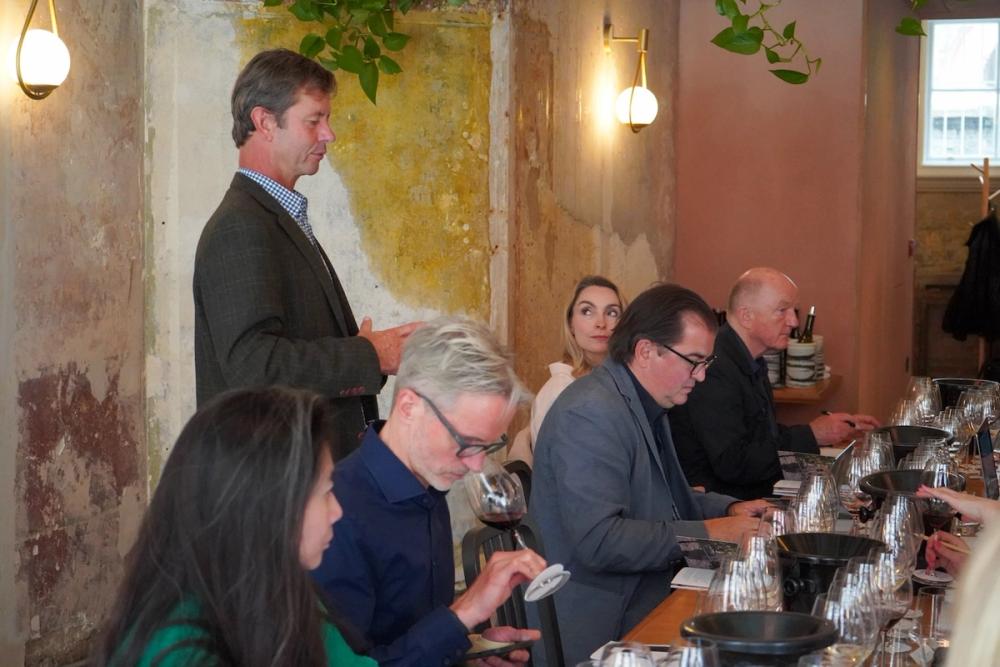
“The Reyneke farm ticks all the boxes, but it’s not a box-ticking exercise.” Johan Reyneke, Apricity, London, June 3, 2025
Constructive criticism
The focus of the day was firmly on farming and sustainability, even though the centre of attention was a new range of wines in fresh packaging. This new lineup reconfigures the Reyneke Wines range and incorporates a number of well-established bottlings, such as the Biodynamic and Reserve range, which will no longer be produced.
“A few years ago, a study was done in California that put a spotlight on the impact wine bottles have on the industry’s carbon footprint,” Reyneke explains. “We were told our bottle weights were too heavy and we took that to heart. It presented us with the opportunity to give our bottles and overall packaging proper consideration, and to bring them in line with the rest of our on-farm activities.”
That is the sound of someone responding positively to constructive criticism. Refreshing, isn’t it? A thoughtful and robust exercise was undertaken to look at what was actually sustainable (as opposed to just having sustainable marketing optics) and across the portfolio, bottle weights were reduced from 580g to 450g for premium wines, and from 460g to 420g for entry-level wines, without compromising aesthetics. This reduced Reyneke’s already low carbon footprint by 22 per cent.
Changing bottle weights also led naturally to a rethink of how the range was structured.
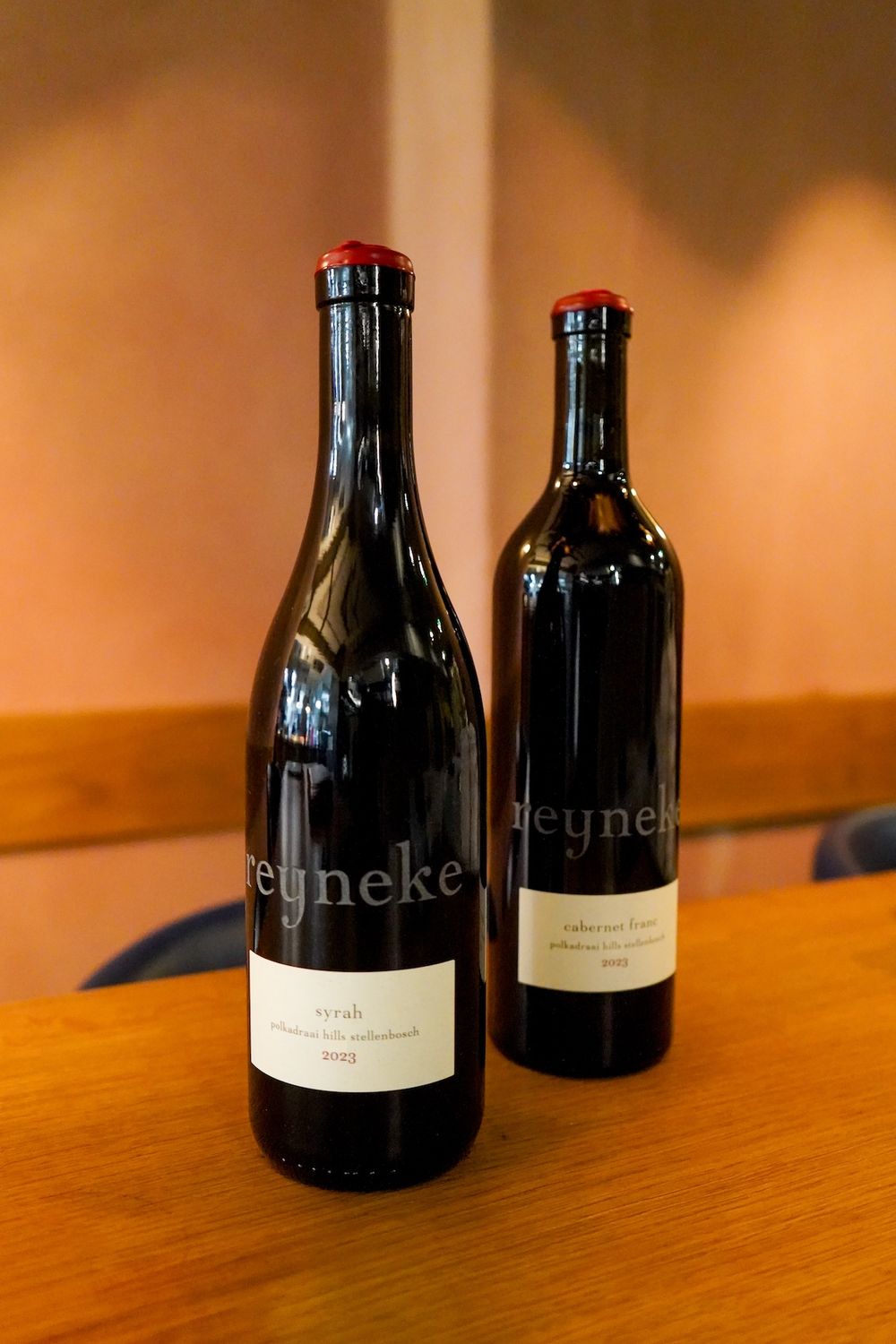
The move to lighter bottles facilitated a complete rethink about the range
“We used this opportunity to bring more focus to the Reyneke range and to give a true reflection of all the new vineyard and farm developments taking place. With the new range, we want to show what Polkadraai is capable of in terms of showcasing Syrah, Cabernet Sauvignon, Cabernet Franc, Chenin Blanc and Sauvignon Blanc.”
The Estate Range is the new expression of Reyneke’s best vineyard material from its Stellenbosch farm. While the wines are priced between the old Biodynamic and Reserve tiers, they are of Reserve quality – and more environmentally friendly. The winery has eliminated energy-intensive screen printing, replacing it with sandblasted logos. Labels are now made from recycled agricultural pulp, with a 20 per cent lower carbon footprint, and the wax closures have been refined to just cover the lip of the bottle, making them both more sustainable than capsules and more practical for service.
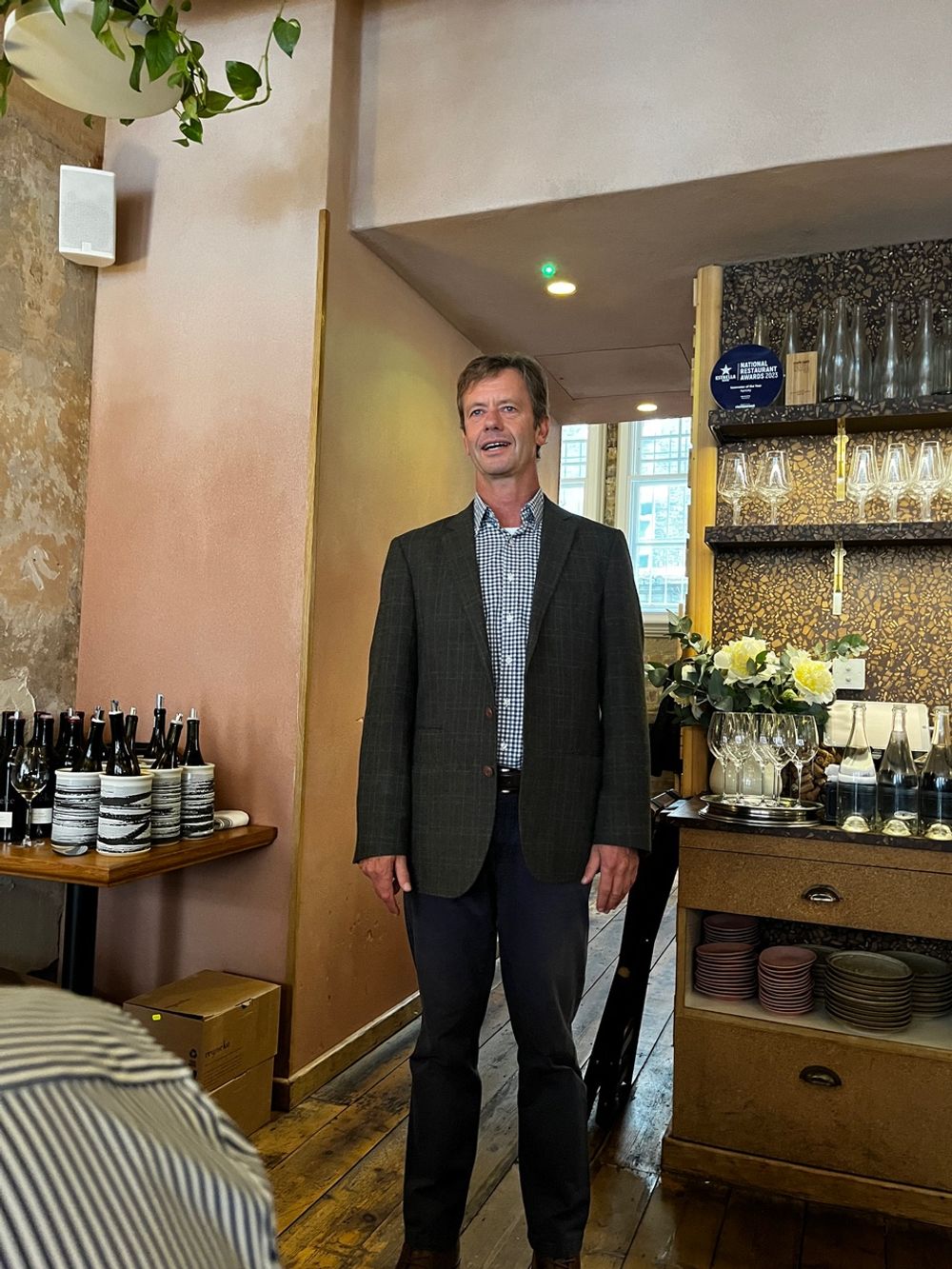
“Conventional agriculture is one of the big five drivers of climate change. But regenerative farming can sequester carbon every day."
Sustainability champions
Behind the bottles, the Reyneke farm has been an organic, biodynamic, regenerative and sustainable pioneer for over two decades. “It ticks all the boxes, but it’s not a box-ticking exercise,” Reyneke quips.The farm is located in the now-fashionable subzone of Polkadraai. “It’s Stellenbosch, but it’s a really cool corner of Stellenbosch – unique granite soils, high altitudes, and vineyards that all face the sea.” It shows in the wines, which have firm acid lines, defined tannins and a pleasing sense of restraint.
“We’ve been certified organic and biodynamic since 2006, but we’ve been farming this way for 25 years.” The approach is based on two principles that Johan refers to as land sparing and land caring.
Land caring focuses on regenerative farming practices, while land sparing preserves fynbos and resists the monoculture of vineyards by creating biodiversity corridors through land that could otherwise be planted to vines.
“We’re trying to create a buffer around the farm, then have meandering wildlife corridors and islands of risk management and stability. You get stability through diversity. The more diverse the ecosystem, the more stable it becomes.”
His belief in the positive power of regenerative farming is clear. “Conventional agriculture is one of the big five drivers of climate change. But regenerative farming can sequester carbon every day. This type of agriculture gives us one of the biggest levers to sequester carbon on behalf of everyone on the planet.”
The idea of farming as a force for good is underpinned by Johan’s academic background in environmental ethics. Sustainability informs every part of the farm, including social initiatives that provide housing and fund education for workers through the Cornerstone project.
Reyneke has worked with Rosa Kruger on planting resilient and climate-adapted vineyards and preserving old vines. “We rethought row direction for both erosion and vine balance. The perfect angle lets the wind run up through the vineyards,” he says, reducing disease pressure through aeration. “What she has done is remarkable. She is a wonderful person and a great viticulturist who has been instrumental in taking our vineyards to the next level.”
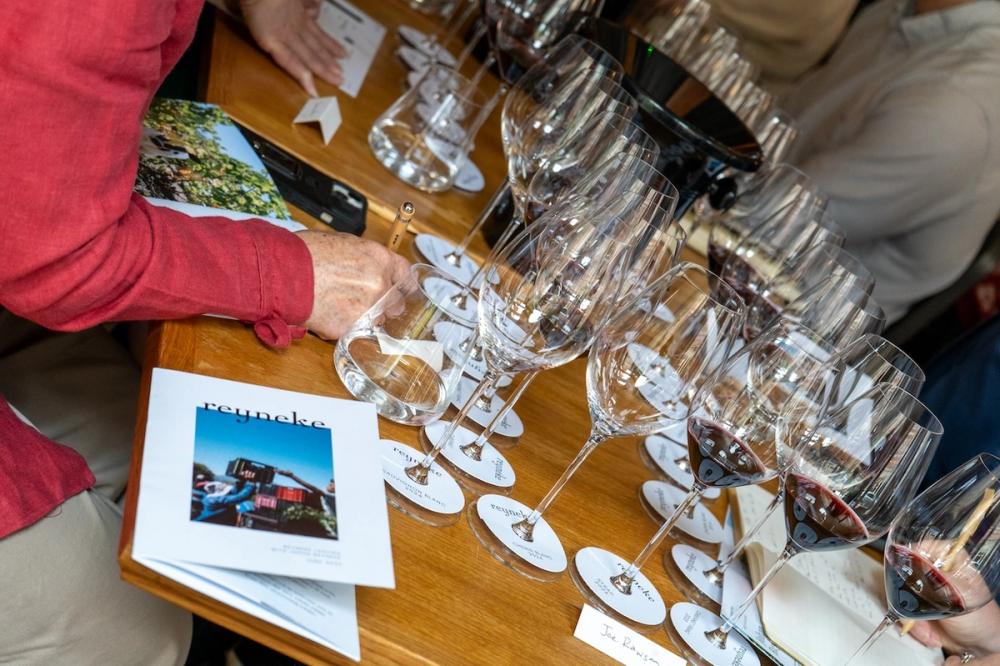
Winemaking evolves
The new Estate Range also reflects changes in the cellar. Barbara Melck, recently named Best Winemaker at the Winemag.co.za awards, has been working behind the scenes for several years. The goal is to bring more generosity and youthful accessibility to the wines while highlighting Polkadraai’s character through varietal wines.
“She’s stepped into her own space and challenged a lot of our systems to good effect,” Johan says. “She suggested aligning Sauvignon with oak, and Chenin with clay and it’s worked brilliantly. We’ve also introduced submerged cap fermentation and adjusted our picking regime – that came from Barbara, too.”
Unstinting in his praise for the team around him, Johan shares the best piece of advice he’s ever received: “Surround yourself with people better than you.” No mean feat when you’re Johan Reyneke, one of the most inspiring and pioneering figures in the wine world. With the release of this new range, supporting good farming just got even easier.
It’s hard to think of another winery whose wines you could feel better about buying.
Tasting Notes
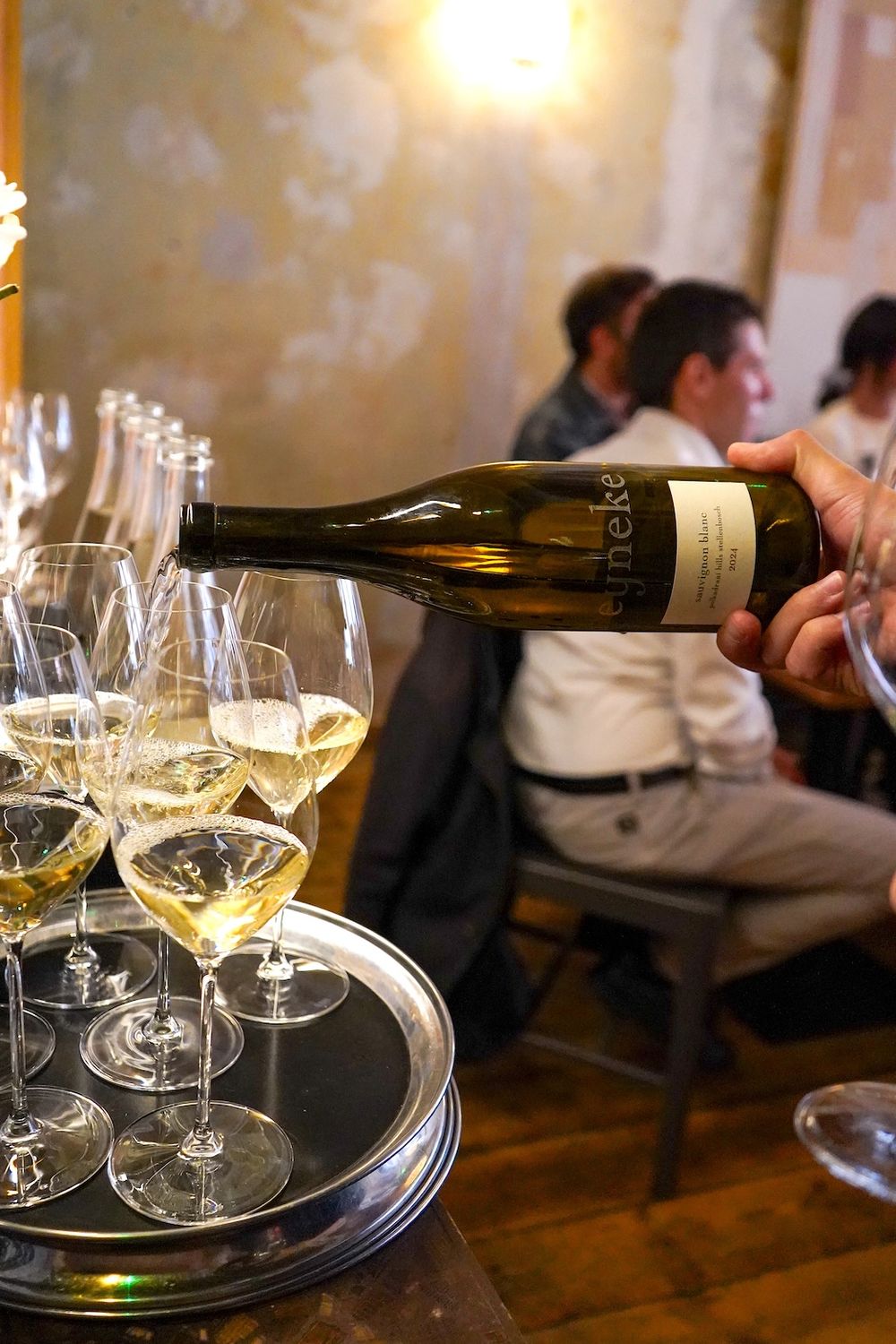
The tasting and launch were held at Apricity in London's Mayfair, an inspired choice by New Generation’s marketing director, Valerie Lewis. Apricity is a small but influential restaurant that champions regenerative farming and plant-based eating. It is paper-free, and its seasonal menu is structured around a set format that unites sustainability with fine dining, it currently holds a Michelin Green Star.
Reyneke’s new Estate Range replaces the old Biodynamic and Reserve ranges, and at a more attractive price, making it a compelling option for buyers looking for both sustainability and value on the shelf or wine list. Trade enquiries should be directed to New Generation Wines, Reyneke’s long-term importer and agent in the UK.
Overall, the 2024 whites were a little more open and ready on the day, with layered aromatics, good acids and teasing fruit. The reds reflected the high quality and coolness of the 2023 vintage, with tapered structures and bright, vibrant fruit, and are certain to improve in bottle.
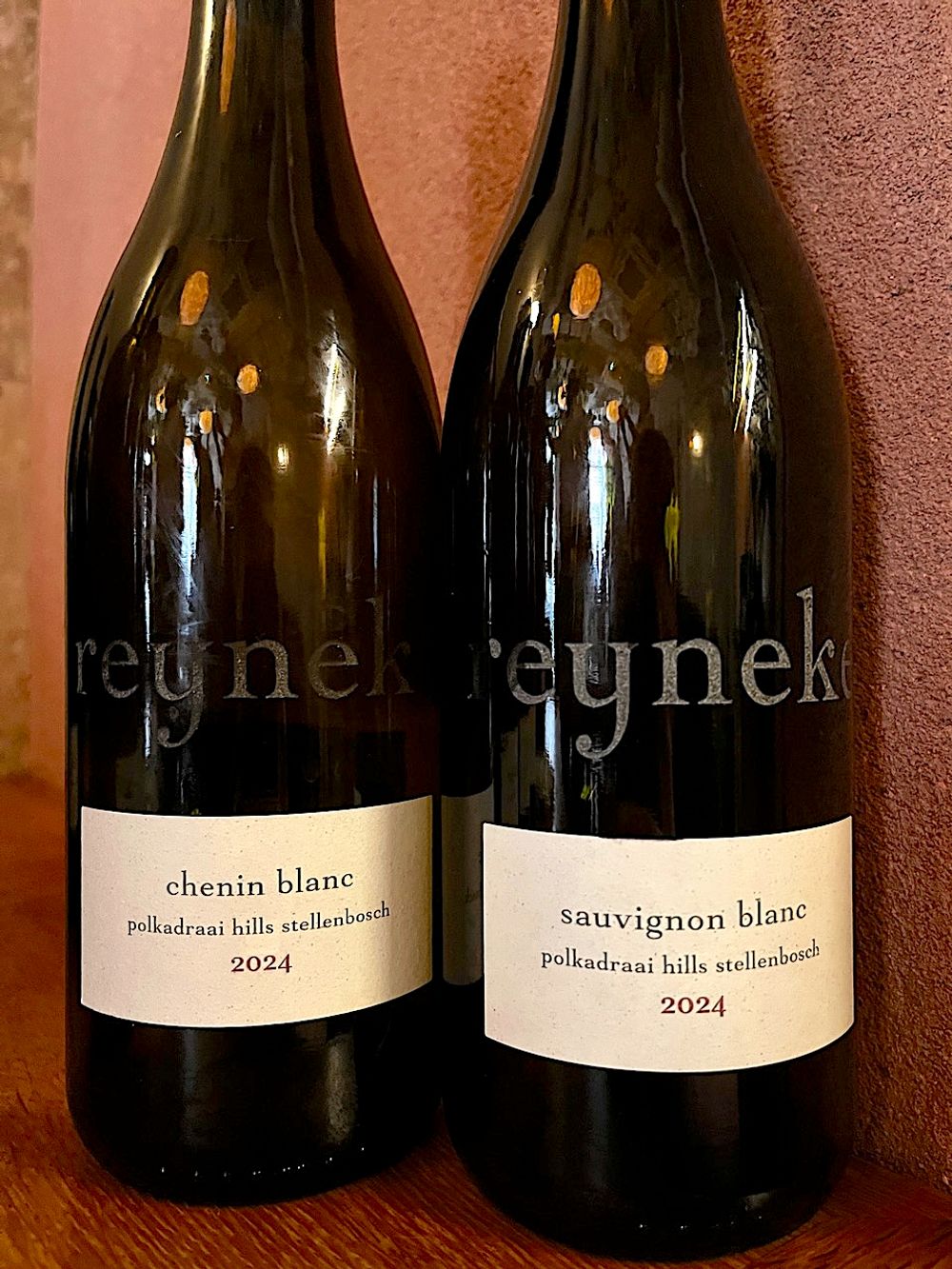
Sauvignon Blanc 2024
Reyneke’s Sauvignon Blanc has always leaned more towards white Bordeaux than Marlborough. The 2024, wild fermented in barriques under Barbara Melck’s direction, shows a zingy, racy and linear fruit profile given texture and breadth in the winery. It’s about intrigue and layered citrus rather than overt aromatics. Pomelo and pink grapefruit lead on the nose, while the oak brings a touch of tahini and gentle grip to the finish. Grown-up, gastronomic and complex. 13%
Chenin Blanc 2024
Made from two plots of old vines planted in 1974 and 1976 and certified by the Old Vine Project, this vineyard received a grant towards its support from The Wine Society. “Old vines have intelligence,” Johan notes, pointing to how the vineyard seems to adapt to each vintage, which makes it worth investing in. Dried banana, apricot and bready, leesy notes emerge carefully from the glass – a far cry from the more tropical expressions of Stellenbosch Chenin, and a marker of Polkadraai’s cooler climate. The finish is lightly waxy with a touch of fresh quince and yellow plum, balanced by integrated, firm acidity. Fermentation is in 500-litre amphorae and 2,500-litre foudres adds gentle oxidative spice. 13%
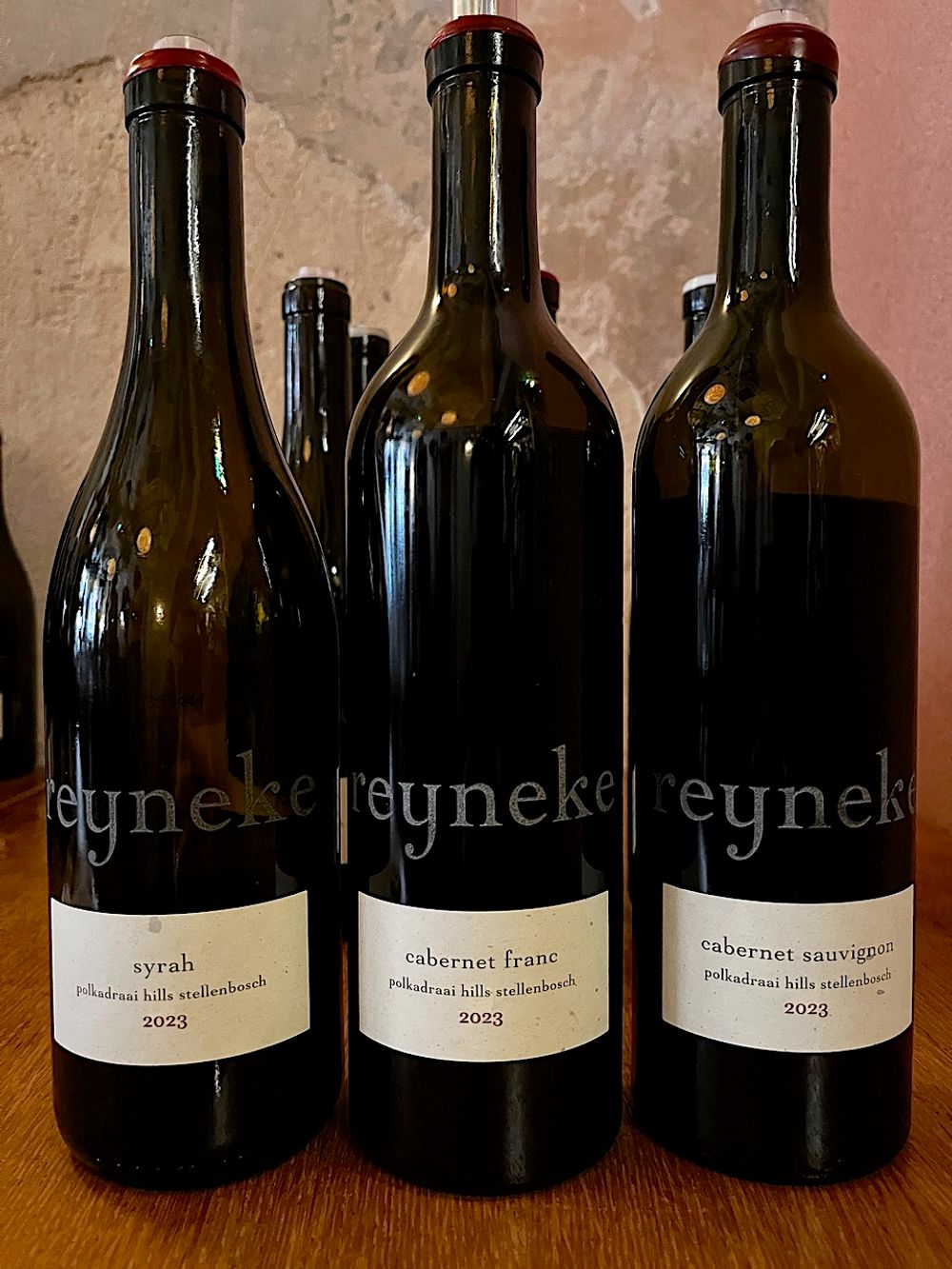
Syrah 2023
A great new vision that effectively amalgamates the Reserve and Biodynamic Syrah, this is utterly convincing as Syrah, though Reyneke points out that this vineyard has changed the most with climate change, shifting from pepper spice to a more fleshy, meaty style. The wine centres on vibrant blue and black fruit – blueberries and ripe blackberry – supported by fresh rosemary and hints of allspice. Fine, muscular tannins shape the palate, which is fleshy, ripe and yet without any fat, finishing long and juicy, and improving with air in the glass. One third of the fruit is whole-bunch fermented in open-top concrete vats with submerged cap management – a Melck innovation. The wine then spends 16 months in older oak of both 2,500-litre and 400-litre format. 13.5%
Cabernet Franc 2023
Reyneke’s Cabernet Franc always went into the Cornerstone cuvée, and this is the first time it has been bottled as a standalone wine. The inaugural 2023 reveals cool, lightly sandy tannins, violet perfume, a burst of blackcurrant fruit and aromatic notes of Earl Grey tea without any overt herbaceousness. It offers a beguiling combination of levity and depth. “The easy child in the family, from a viticulturalist’s point of view,” Johan says. “It has a natural balance between growth and yield.” This was a major talking point on the day, since Cabernet Franc has a proven track record in Polkadraai, thanks to producers like Raats Family Wines. This will be an exciting bottling to watch in the hands of Reyneke and Melck. 13.5%
Cabernet Sauvignon 2023
Reyneke calls this the most challenging grape on the farm. There’s a hint of truculence to the wine – small berries and tight clusters are typical of the variety, but are further encouraged by low-yielding biodynamic farming. The result is a firm array of tannins, behind which sits blackcurrant fruit, Assam tea and dried oregano. From a cool, south-east-facing block, this is the one wine in the new range that could do with another year in bottle at this stage. Fermented in open-top concrete and aged in 100% new wood for 18 months, it shows no overt oakiness in the glass, and its current restraint is likely to be to its future credit. 13.5%
The Reyneke Wines are imported and sold in the UK through New Generation Wines which is a commercial partner of The Buyer.






























